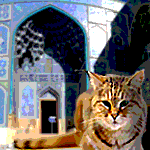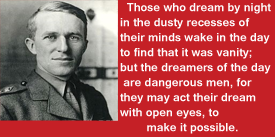Introducing Dr. Phage.
Dr. Phage is a notorious scoundrel, among the founders of alternative radio in Seattle and still involved with subversive organizations that support creative free speech. He is also an emeritus professor at UW who was among the founders of the Department of Genetics.
Dr. Phage spews on his biography
Unaccountably, T.E. did not include my own category, those who sleep
at night, and then go to work by day and get plenty of sleep there as
well. I find that taking cat-naps four or five times a day helps to
keep me in the pink, and the ivy-covered halls of academe, with their
windy faculty meetings and frequent seminars, have long provided an
ideal venue for this practice.
I first understood that I was well suited to the academic life back in
college when I attended my first academic seminar. It was a veritable
epiphany: the room was warm, a speaker at the front was doing the
equivalent of counting sheep for me, and then the lights went out for
the first slide; I settled back comfortably in my chair, and knew no
more until the lights came back on after the last slide. I realized
then that I had discovered a true calling, like Paul on the road to
Damascus.
My career of sleeping through seminars continued in graduate school.
One time, I was seated next to the Associate Director of our
institute, a tough-talking biochemist who was reputed to have mob
connections. Everyone referred to him as Big Al.
Realizing that I was seated in a sensitive location, I fought to
retain consciousness as the speaker droned on and on, and actually
made it to the third slide before I retired to never-never land,
slumping sideways at the same time so as to use Big Al for a pillow.
When the seminar ended I awoke, refreshed as always, and looked
blinkingly around. Turning to my left, I made eye contact with Big Al,
who was fixing me in a stare that would freeze helium. “Ya feel bedduh
now?” he growled.
Fortunately, Big Al was not on my Ph.D. thesis committee, and in due
course I earned that key of entry into the academic world. It has been
a long and rewarding career since then. Several years ago, I underwent
a medical procedure on one eye. I was told I must sleep sitting up for
ten days or so. No problem. I had already had thirty-five years of
practice.
Beginning grad students regularly marvel at the ability of us veterans
to spend an entire seminar, qualifying exam, or thesis defense in the
arms of Morpheus, and then rouse at the end to ask a seemingly
relevant question. Little do they suspect that this ability is the
secret, the kernel, the very Zen of the professorial vocation. I have
practiced this form of Zen, which is also known as Cheyne-Stokes
breathing, at innumerable seminars and conferences all over the
civilized world. My long career, which might appear arduous from a
superficial viewpoint, has actually been extraordinarily restful.
 Reviewing this career, I cannot help but be reminded of that old New
Reviewing this career, I cannot help but be reminded of that old New
Yorker cartoon in the form of a recruiting poster: “Join the Cat Navy
and get to sleep in ports all over the world.” Could this be the
reason for my lifelong feeling of kinship with the feline community?
As things have worked out, I no longer enjoy the services of a
full-time cat at my home. However, I do have two visiting cats who
come to work part-time. Sarge, whose official residence is a couple of
blocks away, is an orange tabby with polydactyly of his forepaws and a
winning manner. We have a special cat entrance for him at a back
window, loosely covered by a cloth flap. Sarge can be relied upon to
come in this way several times each day, and immediately ask to be let
out at the front door.
In addition to providing this service, he also does a complete
inspection tour of the house, at least if he is not let out too soon.
There is no warm nook or soft spot in the house too obscure for him to
overlook; in fact, he spends more time testing these spots in my house
for their sleep-worthiness than he spends at his official home.
Occasionally, Sarge’s owner telephones to leave a message for him.
As a back-up, I employ Dusty, a fluffy, grey-blue Russian who patrols
the front porch most of the day. His official headquarters is across
the street, and unlike Sarge, he never sleeps, but always keeps watch.
Perhaps the Russian Blue breed has some kinship with the NKVD, or the
earlier Okhrana, the Tsar’s secret police. In any case, Dusty always
moves with the stealthy air of a secret agent, perpetually looking
around for enemy operatives. He accepts being petted or offered some
food on the front porch with elaborate wariness, always poised for
flight.
Dusty occasionally sneaks into my domicile to photograph classified
documents, incidentally filching a little of the food left for Sarge.
His stealth is such that I have never caught him in the act of
slipping into the house. But I have discovered him already inside on a
few occasions, at which times he escaped with the speed and agility of
a four-legged Agent 007. All I have ever seen of his departure is a
blue blur heading toward and through any exit available. Sometimes it
is not at all clear how the blue blur exits the house [is it able to
pass through walls?] but out it gets, after which Dusty no doubt
assumes another identity for a time.
As a result of communing with these creatures, I have arrived at a
theory to explain why cats are so appealing. They are soft, furry,
cuddly, and the right size to pick up: exactly like the stuffed
animals we all played with as children. They are, in short, animated
stuffed animals, stuffed with themselves. But then, the question
arises of why stuffed animals were so appealing to us when we were
children. The answer must be that they are like real animals, such as,
for example, cats. But cats, we just concluded, are appealing
precisely because they are like stuffed animals. We seem to be caught
in a loop.
I see that continuing on this line of thought could be dangerous for
my diminished supply of grey cells. Perhaps what I need is a cat-nap.
I have been taking even more cat-naps of late, since I came down with
an academic condition called Emeritis. Now that I am Emeritus, I no
longer have to ask all those seemingly relevant questions at the ends
of seminars. All I need to do nowadays is to stretch, blink, look
around, and discover that everybody else has already left, sometimes
an hour or two earlier. When not enjoying these restful seminars, I
can generally be found in my University office these days, handling
the weighty academic responsibilities that remain to us Emeritii.
First, of course, there is the academic mail: I take up one University
notice after another, and painstakingly fold each one into an Origami
bird-shape. This is a demanding project, not to be undertaken lightly.
Next comes processing the day’s e-mail, which calls for the careful
judgment in deciding among the tons of spam for elimination. On some
days, after these projects are complete, there is still a little time
for a bit of web-surfing before my mid-morning pre-nap nap. In short,
Emeritusness is rather like the earlier stages of my brilliant career,
or life in the cat community, only more so.
— Dr. Phage


Doc, you would fit right in at any legal seminar or appellate oral argument.
Except for those with the appropriate copyright notification, all essays, reviews, and poems that appear here belong to The Reginald A. Fessenden Educational Fund, Inc. All rights pertaining to these essays, reviews, and poems except for excerpts for review purposes of less than 100 words, are reserved to The Fund.
Those who wish to make written, printed, or on-line copies should contact Lolita Lark Editor
I will pass your concerns on to the author, Dr. Phage himself!